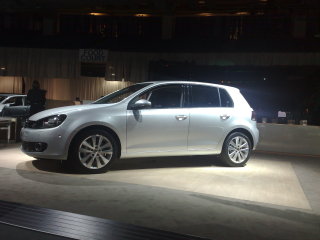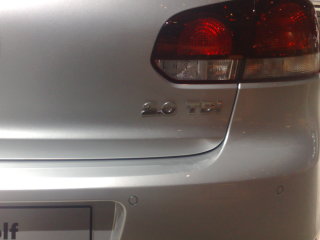
2010 Volkswagen Golf TDI
Who buys new diesel cars? It turns out the answer may be the people who've already owned a diesel.
And that could be bad news for European luxury carmakers who are counting on new diesels as the way to meet increasingly stringent new gas-mileage and emissions standards.
That's one conclusion we draw from a couple of unrelated news reports on the prospects for light-duty diesels in the US market.
VW: 30 percent of 2010 Golfs will be diesel
First, if you're eager for a new 2010 Volkswagen Golf TDI, get ready to take a number and stand in line.
VW thinks up to 30 percent of Golf buyers will go for the oil-burner option, just like 30 percent of Jetta buyers and an amazing 50 percent of Jetta Sportwagen buyers.
The comparable figure for Mercedes-Benz is 8 percent of total sales. On the other hand, BMW, whose new 335d and X5 diesel hit the market this year, is seeing lower-than-projected sales of just 3,000 for the year.
But VW diesels have a strong fan base. Month after month, we're amused that our old piece on the 2010 Golf TDI continues to rank among our top five most-read articles.
In part, that's because VW has sold hundreds of thousands of diesels in the US, starting way back in 1978. And unlike Mercedes-Benz, the other traditional diesel vendor, Volkswagen's diesels are actually affordable by real people. Not a single Benz diesel stickers at less than $40,000.
Morpace: New-car buyers interested, uninformed, cautious
The second piece of evidence is a Morpace study on the projected lack of acceptance in the US for new clean diesels. As well as Mercedes-Benz and Volkswagen, with new arrival BMW, clean diesels are on tap from Audi (the Q7 TDI is now arriving) and potentially other carmakers as well.
In the report known officially as the Morpace Powertrain Acceptance & Consumer Engagement (PACE) study, the research firm says almost two-thirds of new-car buyers think diesels have "gotten better" over the past decade.
And one third would "consider" buying a new clean-diesel vehicle. Perhaps contrary to VW's experience, Morpace says small-car buyers are least interested in diesels.
Overall, the report paints a picture of buyers who may be open to clean diesel but remain concerned about its cost, the higher cost of diesel fuel against gasoline, and the enduring image of diesel engines as noisy, smoky, and unreliable.
Putting these two together, we'd suggest that the most likely clean-diesel buyer is someone who's previously owned--and liked--an older diesel. And we think Volkswagen, which offers affordable diesels in small, fun-to-drive cars, has the most to gain.
Trouble ahead for some Germans?
The same applies to Mercedes-Benz, though to a lesser extent, just because its cars cost more. But the company introduced the first passenger diesel in 1936 and has been selling them in the US longer than any other maker, so it too has a base of satisfied owners.
For the rest--Audi, BMW, and others--we think it'll be a much harder climb. Despite rave reports that clean diesels offer oceans of smooth torque plus stunning fuel economy, US new-car buyers just don't associate German luxury sports sedans with diesels.
Sadly, we suspect that means we'll have to wait a lot longer for the US version of the 2007 Audi A6 TDI we enjoyed so much. Sigh.

VWvortex reader Bajan2.0T snapped this shot of the badges on the 2010 Golf TDI that was displayed at the Toronto Auto Show.
[SOURCES: Left Lane News, The Detroit Bureau]













